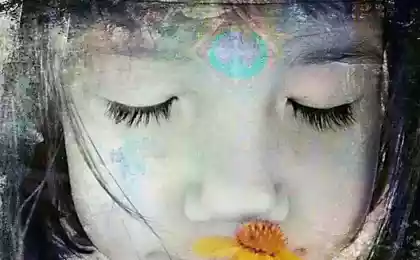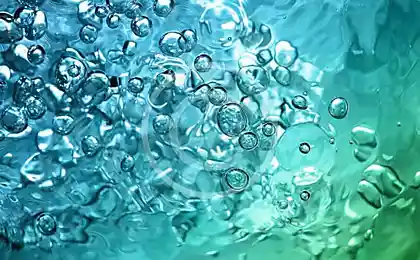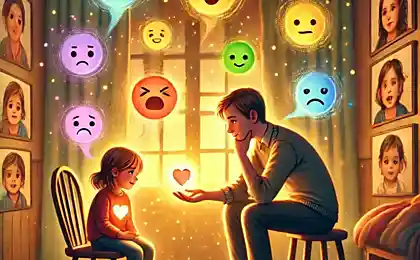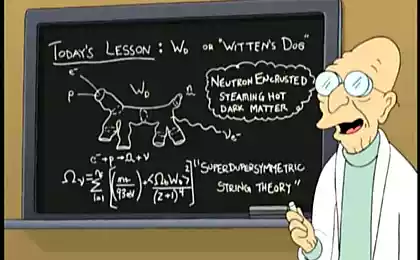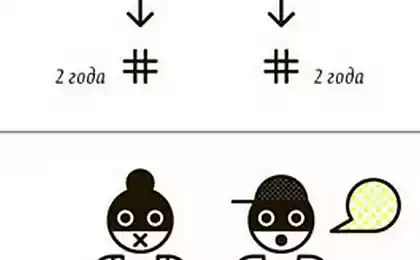476
Water remembers human emotions and words
Until some time it seemed that easier and Azucena water, nothing can not be. Jagged all formula, temperature metamorphoses from ice to steam, the ability to dissolve some substances and participate in the process of convection — that's almost all. Deepening of science in the nanoworld able to shake confidence in the simplicity of water. Though, because, as it turns out, she has her memory and she understands human emotions and words.
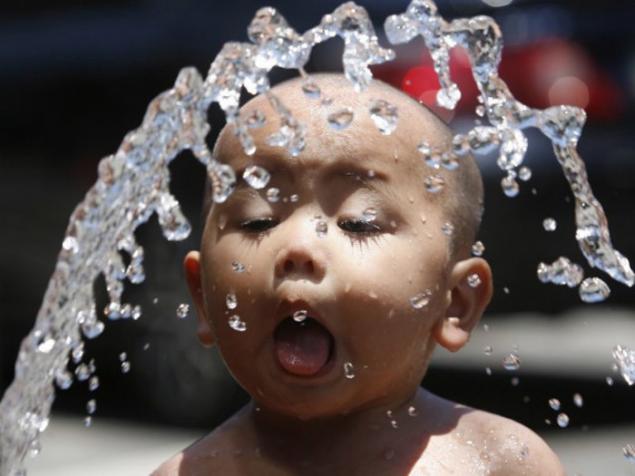
The water forms a structure
The science of physics in the school sense of the word teaches that water is mainly the state does not form long-lived structures (if only in the case does not interfere with third-party stuff). That is, of course, there is the so-called hydrogen bond, due to which water molecules can be connected in chains, but such education is negligible live time ten to the minus sixteenth degree seconds. In theory, this means that it is impossible to structure the water - at least all of these stories about magnetized water or water that "remembers" when something is dissolved in it substances that has long passed under a signature stamp "it is unscientific". However, for several years absolutely serious researchers armed with ultra-precise devices involved in that study the ability of water to arrange the same long-lived structure.
Thesis on the memory of water
Championship — how nice! — for us: it turns out that in the Institute of biomedical problems of RAS in 2003 defended thesis on the topic of water memory. Author — Stanislav Zenin, a scientist with my lab, two master's degrees and one doctorate. His brainchild, the clathrates, stable (with a life span of up to several hours!) compounds of 912 molecules of water the size of polymicron micron, which Zenin considers its main structural element.
They are even seen — in contrast-phase microscope. In distilled water clathrates is practically electroneutral. However, Zenin found out that their conductivity can be changed. If you stop stirring, the relationships between elements of clathrates will be destroyed and the water will turn into dead, disordered mess.
If put in water is extremely small quantity of another substance (one molecule) — clathrates will begin to "learn" its electromagnetic properties. Finally, Zenin attracted to the thesis work of psychics and folk healers — the audience in the scientific world absolutely not respecting — and found out that some representatives of this dubious craft are often capable of the power of his mind greatly change the conductivity of the water. Zenin gave a definition of water-like substance in the information-phase state, of a substance having a structure suitable for storing data, biological information storage. However, he distinguished two types of "memory" of water, primary and long-term. The primary memory of water appears after a single exposure and is a reversible change in its structure and display on the surface of the clathrates of the new electromagnetic picture. Long-term memory of water — the total transformation matrix of the structural elements in the clathrates as a result of long information influence. That is, to form a certain structure of water, not necessarily to be psychic: enough for some time to pass water certain emotion.
Emoto Masaru researcher the memory of water
Exactly the same conclusion was made by Japanese scientist Masaru Emoto: using the magnetic resonance analyzer, he found that the water really forms an ordered structure of the crystals, which are absolutely identical crystals are not found and that these crystals undoubtedly reflect the electromagnetic properties of water. Microcrystals studied the photographs: first, water droplets placed in a Petri dish, and rapidly cooled for two hours and then placed in a special device — a cooling chamber, combined with a microscope and a camera. Where at a temperature of minus five degrees to consider the crystals and relieve the most typical. In this study the samples from various water sources in the world, as well as water subjected to various types of exposure (music, image, the radiation of the TV, thoughts of one person and groups of people, prayer, printed, and spoken words in several languages). Dr. Emoto found that there is a substantial difference between the crystal water listen "Pastorale" by Beethoven and a song in the style of"heavy metal", between patterns that have said "thank you!" and "you make me sick", and the words "angel" and "devil" form structures, both similar and completely opposite.
How to use the memory of water?
Of course, Dr. Emoto can be attributed to the visionaries who use a complex technique for other purposes: a Japanese scientist believes that the basis of everything is a single vibrational frequency, resonance wave (in his terminology — HADO), and this wave is able to endure the emotions of people on all surrounding objects. Therefore, according to Emoto, we have to thank the food that you eat to suppress negative emotions and to pray more often. Such conclusions can only laugh serious scientific community.
But fellow scientist demonstrate a utilitarian interest in his work: some developers are looking for ways to transform the processes occurring in the water under the influence of electromagnetic radiation of the human brain to computer understandable signals. That is thinking about computers that can be controlled by thought. Others want to teach water to store binary code. Still others ask is it possible to change the physico-chemical parameters of water for special purposes (e.g., to make it more viscous, so less power to cool nuclear reactors).
This situation might one day lead to the fact that just at the moment when theoretical science will no longer doubt of the right of water on the memory practices of the mill technology is ripe to prototype "water" computers on the telepathic control. And then it comes to production.
P. S. And remember, only by changing their consumption — together we change the world! ©
Join us in Facebook , Vkontakte, Odnoklassniki
Source: alka-mine.at.ua

The water forms a structure
The science of physics in the school sense of the word teaches that water is mainly the state does not form long-lived structures (if only in the case does not interfere with third-party stuff). That is, of course, there is the so-called hydrogen bond, due to which water molecules can be connected in chains, but such education is negligible live time ten to the minus sixteenth degree seconds. In theory, this means that it is impossible to structure the water - at least all of these stories about magnetized water or water that "remembers" when something is dissolved in it substances that has long passed under a signature stamp "it is unscientific". However, for several years absolutely serious researchers armed with ultra-precise devices involved in that study the ability of water to arrange the same long-lived structure.
Thesis on the memory of water
Championship — how nice! — for us: it turns out that in the Institute of biomedical problems of RAS in 2003 defended thesis on the topic of water memory. Author — Stanislav Zenin, a scientist with my lab, two master's degrees and one doctorate. His brainchild, the clathrates, stable (with a life span of up to several hours!) compounds of 912 molecules of water the size of polymicron micron, which Zenin considers its main structural element.
They are even seen — in contrast-phase microscope. In distilled water clathrates is practically electroneutral. However, Zenin found out that their conductivity can be changed. If you stop stirring, the relationships between elements of clathrates will be destroyed and the water will turn into dead, disordered mess.
If put in water is extremely small quantity of another substance (one molecule) — clathrates will begin to "learn" its electromagnetic properties. Finally, Zenin attracted to the thesis work of psychics and folk healers — the audience in the scientific world absolutely not respecting — and found out that some representatives of this dubious craft are often capable of the power of his mind greatly change the conductivity of the water. Zenin gave a definition of water-like substance in the information-phase state, of a substance having a structure suitable for storing data, biological information storage. However, he distinguished two types of "memory" of water, primary and long-term. The primary memory of water appears after a single exposure and is a reversible change in its structure and display on the surface of the clathrates of the new electromagnetic picture. Long-term memory of water — the total transformation matrix of the structural elements in the clathrates as a result of long information influence. That is, to form a certain structure of water, not necessarily to be psychic: enough for some time to pass water certain emotion.
Emoto Masaru researcher the memory of water
Exactly the same conclusion was made by Japanese scientist Masaru Emoto: using the magnetic resonance analyzer, he found that the water really forms an ordered structure of the crystals, which are absolutely identical crystals are not found and that these crystals undoubtedly reflect the electromagnetic properties of water. Microcrystals studied the photographs: first, water droplets placed in a Petri dish, and rapidly cooled for two hours and then placed in a special device — a cooling chamber, combined with a microscope and a camera. Where at a temperature of minus five degrees to consider the crystals and relieve the most typical. In this study the samples from various water sources in the world, as well as water subjected to various types of exposure (music, image, the radiation of the TV, thoughts of one person and groups of people, prayer, printed, and spoken words in several languages). Dr. Emoto found that there is a substantial difference between the crystal water listen "Pastorale" by Beethoven and a song in the style of"heavy metal", between patterns that have said "thank you!" and "you make me sick", and the words "angel" and "devil" form structures, both similar and completely opposite.
How to use the memory of water?
Of course, Dr. Emoto can be attributed to the visionaries who use a complex technique for other purposes: a Japanese scientist believes that the basis of everything is a single vibrational frequency, resonance wave (in his terminology — HADO), and this wave is able to endure the emotions of people on all surrounding objects. Therefore, according to Emoto, we have to thank the food that you eat to suppress negative emotions and to pray more often. Such conclusions can only laugh serious scientific community.
But fellow scientist demonstrate a utilitarian interest in his work: some developers are looking for ways to transform the processes occurring in the water under the influence of electromagnetic radiation of the human brain to computer understandable signals. That is thinking about computers that can be controlled by thought. Others want to teach water to store binary code. Still others ask is it possible to change the physico-chemical parameters of water for special purposes (e.g., to make it more viscous, so less power to cool nuclear reactors).
This situation might one day lead to the fact that just at the moment when theoretical science will no longer doubt of the right of water on the memory practices of the mill technology is ripe to prototype "water" computers on the telepathic control. And then it comes to production.
P. S. And remember, only by changing their consumption — together we change the world! ©
Join us in Facebook , Vkontakte, Odnoklassniki
Source: alka-mine.at.ua



